| |
 The
Etsha villages are a series of 13 communities stretching about twenty kilometers
along the west side of the Okavango Delta. Ostensively they were formed by
thirteen clans of the Mbukushu people who fled south from Angola to Botswana
during the Angola civil war. Because the delta and The
Etsha villages are a series of 13 communities stretching about twenty kilometers
along the west side of the Okavango Delta. Ostensively they were formed by
thirteen clans of the Mbukushu people who fled south from Angola to Botswana
during the Angola civil war. Because the delta and its banks were
already inhabited by the Biyeyi most of the Etsha communities have a mix of
at least
Mbukusu and Biyeyi. its banks were
already inhabited by the Biyeyi most of the Etsha communities have a mix of
at least
Mbukusu and Biyeyi.
Because the causes of the dislocations was decades in
the past it was surprising to still see some tents in the community.
  Overall,
Etsha 13 seemed to be a vibrant community: Around the "bus rank" was a
number of shops that seemed to have a steady trickle of customers. I
am not sure if it was part of her business or a courtesy for a friend, but
when one shop keepers didn't have a customer in the shop she was braiding
extensions into another woman's hair. Overall,
Etsha 13 seemed to be a vibrant community: Around the "bus rank" was a
number of shops that seemed to have a steady trickle of customers. I
am not sure if it was part of her business or a courtesy for a friend, but
when one shop keepers didn't have a customer in the shop she was braiding
extensions into another woman's hair.
 There
was also a degree of organization in Etsha 13 that is always seen in
less-developed countries. Here, garbage was collected into bags.
The waste management wagon then went around and collected the bags and
brought them to a central station. Presumably, they were later loaded
onto a larger truck and taken to the landfill. In addition there was a water
system in the town, electric power, health center and several schools. There
was also a degree of organization in Etsha 13 that is always seen in
less-developed countries. Here, garbage was collected into bags.
The waste management wagon then went around and collected the bags and
brought them to a central station. Presumably, they were later loaded
onto a larger truck and taken to the landfill. In addition there was a water
system in the town, electric power, health center and several schools.
Our purpose for being here was to get out into the
delta and get a snapshot of life there. Our guides and outfitters for this phase of our
adventure were Real Mokoro Safaris.
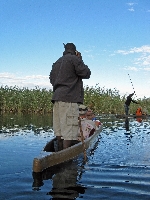 Here
is the office for Real Mokoro Safaris (photo left: Simon on his cell phone) --
well not exactly, but if could be because the best way to make arrangements
with Real Mokoro is by cell phone or text message (SMS). Unlike most
of the other mokoro tours that must be booked through travel agents or
high-end safari lodges, who take a sizable cut, this is very much a
community based organization. There are 25 members of the cooperative, with
very little hierarchy, who rotate duties. Because their base of
operations is in a
working part of the delta, participants can get a stronger sense of the
working economy of the delta for the Yeyi people. Here
is the office for Real Mokoro Safaris (photo left: Simon on his cell phone) --
well not exactly, but if could be because the best way to make arrangements
with Real Mokoro is by cell phone or text message (SMS). Unlike most
of the other mokoro tours that must be booked through travel agents or
high-end safari lodges, who take a sizable cut, this is very much a
community based organization. There are 25 members of the cooperative, with
very little hierarchy, who rotate duties. Because their base of
operations is in a
working part of the delta, participants can get a stronger sense of the
working economy of the delta for the Yeyi people.
 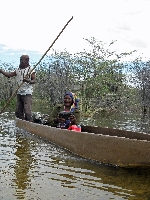 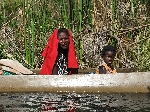 Traditionally
mokoros were flat bottom dugout canoes from the wood of the "sausage tree"
(perhaps Bignoniaceae kigelia africana). They would last about five years.
The shallow draft and unique shape made them idea for the shallow water of the delta
and very stable.
To improve environmental sustainability, mokoros are now all made primarily of
fiberglass -- this includes both those carrying tourist and those that we saw that were being used as part
of local commerce -- carrying farm produce and delta fish to market. Of course there are
the fancier tourist mokoros with seats. Traditionally
mokoros were flat bottom dugout canoes from the wood of the "sausage tree"
(perhaps Bignoniaceae kigelia africana). They would last about five years.
The shallow draft and unique shape made them idea for the shallow water of the delta
and very stable.
To improve environmental sustainability, mokoros are now all made primarily of
fiberglass -- this includes both those carrying tourist and those that we saw that were being used as part
of local commerce -- carrying farm produce and delta fish to market. Of course there are
the fancier tourist mokoros with seats.
For our excursion, our polers/guides were Dodo, Sam and John. We
were impressed at their ability to pole for three hours straight and they were
impressed by our ability to bicycle 70 kilometers in three hours. A
nice mutual admiration society.
[We were also amazed by their ability to keep up a steady
conversation for the three hours going out one day and for the three hours
coming back the next day. These guys grew up together and see each
other every day, what did they still have to talk about?]
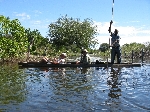
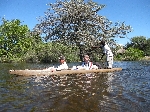
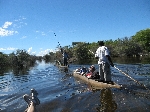
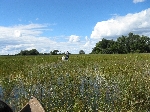
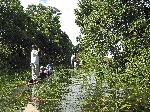
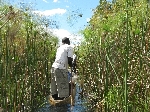
The variation in the delta vegetation was interesting. It ranged
from open rivers, to grasslands, to narrow forest channels, to even narrower
channels through the papyrus beds. Each eco-system also tended to have
different birds associated with it, but this was hard to photograph so you
will have to take it on faith.
 The
delta itself is a slab between two faults (click on the image to the right.)
Depending upon the activities of the faults, the tilt of the delta can
change ever so slightly, which affect the hydrology and flow of water over
the entire region. The
delta itself is a slab between two faults (click on the image to the right.)
Depending upon the activities of the faults, the tilt of the delta can
change ever so slightly, which affect the hydrology and flow of water over
the entire region.
Our home for the night was an island about the size of a basketball
court. If you dug down a foot you hit the water table. I am not
so sure our "island" wasn't actually a float that with a few more people on
it could have sank. We were treated to a very beautiful sunset at the
end of the day -- there is no PhotoShop on the last image!
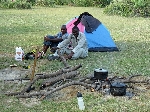
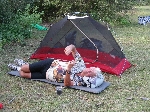
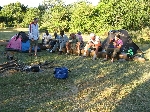
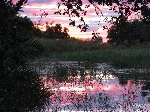
|
Addendum:
Bayei & Mbukushu
Culture:
(Source Sangwali Museum)
The resettlement of the Bayei and Hambukushu on the Okavango
brought the matrilineal cultures of the Zambezi to Ngamiland, and the
establishment of a culture based on utilization of the resources of the
flood plain working within the rhythms determined by the flood cycle. Their
main source of subsistence is the river from which they fish and gather
water roots and other native materials, which they employ in creating the
utilitarian articles they require.
Today there are about 40, 000 people living in scattered villages
around the delta, leading a semi-nomadic existence in that they must
continually seek fertile fields and new grazing land for their cattle as
dictated by the exigencies of the flood plain. Since residence depends on
the seasons, there is considerable mobility between their villages and
cattle posts, meraka, which are not permanent fixtures. Most of the
Bayei and Hambukushu tend to require at least two different dwelling places,
although even three is not unusual. The abundance of raw materials offered
by the Okavango and the geographical isolation of the of these peoples has,
until recently, protected their traditional crafts from competition with
commercially produced articles.
(Levinsohn, Rhoda. 1984. Treasures in transition: Art and craft of
Southern Africa, p 29)
(more)
Real Mokoro Safaris
At the time of our visit the contact information
was: Real Mokoro Safaris, PO Box 116, Etsha 6, Botswana. Or, by telephone or
text message to:
Onosi Dodo -72538006,
Simon Letsatsi - 72562002,
Allen Ipolokeng Moxhaakhwe
- 72595176,
Johane Boitshepho - 72501913,
or Johnson Gosalamang Karelo -
72802616.
Please let us know if you find that any of this has changed.
|



















